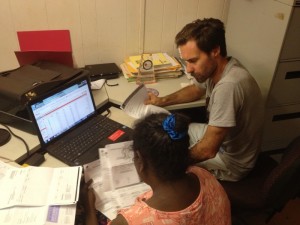What do the Enterprise facilitators NOT do?
There are a number of problems that will arise when facilitators enter communities and become available to help people. The methods we are using have well defined strategies to manage the main problems.

There are a number of problems that will arise when facilitators enter communities and become available to help people. The methods we are using have well defined strategies to manage the main problems.
We know from experience that some people will want to take advantage of the facilitator, thinking the facilitator will be able to get them easy money or hoping the facilitator will create their idea without them having to put in their own sweat and work.
These problems do not just occur in Indigenous communities; this is how Ernesto Sirolli describes the ways some clients try to use facilitators from his experience in Balanda (mainstream) communities;
Clients may come to you thinking that:
• You have money to give them (welfare agent)
• You will grow their baby [their idea] for them (nurse)
• You will sell their invention (broker)
• You will make them rich without them doing anything (lottery commission)
To avoid this kind of dependency thinking the facilitator must be disciplined to follow these rules:
Never initiate contact with a client
Never seek to motivate a client to action
Work only with a client who is passionate enough to want to work to make their idea happen.
Never allow the client to think that the facilitator has any special power or authority.
The facilitators will wait for local people to request help; they do not go out and find people to help. If they were to go out offering to help, this would put all the responsibility on the facilitator and they would become like a parent looking after a child. The facilitator and client must relate to each other as equals, as adults.
Facilitators will not do everything for the client. Facilitators will not chase up on clients. Clients must keep up contact with the facilitator and not expect the facilitator to always contact them. If clients do not do things to start their idea in their own time and space, then the facilitator cannot keep working with that person. This ensures that the client is truly motivated to turn their own dreams into reality.
Often in Arnhem Land, Balanda start out working for the people but end up doing everything, with Yolŋu doing very little. To ensure that the local person or group remains foremost in the running of and participation in their enterprise, the facilitator must remember: they are not any kind of saviour for this person, they are equals, and the enterprise must live or die based on the work of the visionary not the facilitator.
To prevent this from occurring, the facilitator must follow these rules:
The facilitator must never become an active part in the daily activity of any endeavour the people create, because if they do, they risk taking responsibility and control away from the client and they become less available to help others in the community.
Enterprise Facilitators must not think they have all the answers for the people; this will lead to attitudes such as paternalism, which will tempt the facilitator to unintentionally position themselves as superior to the client or do too much for the client. The only thing the facilitator offers is a “caring, dedicated, listening service and a smart, go-get-it attitude” which is at the disposal of their clients. In Arnhem Land, a knowledge of the Balanda system is also required of facilitators to help the people, but in this, the facilitator is not a source of knowledge but a guide. We will not forget that the people themselves have a system that the facilitator does not understand, and that the facilitators will need the client to guide them through.
Call 1300 501 795 if you have any questions.

